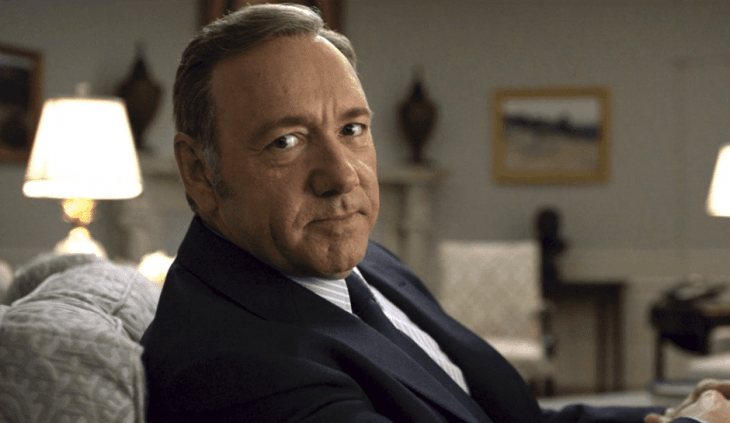Being, as ever, years late to the party, my wife and I were only midway through season one of House of Cards when news emerged that star Kevin Spacey might or might not have drunkenly groped then-14-year-old actor Anthony Rapp in 1986. This presented us with a dilemma: continue to watch and marvel at Spacey’s bravura to-the-house performance, and possibly legitimise what he might have done (he now claims to be too drunk to remember) or consign the show to the e-recycle bin and watch Strictly instead?
We didn’t have to think for too long. Possibly because we aren’t the parents of Anthony Rapp, and possibly because Strictly just isn’t the same without Bruce. We are now midway through season two – no spoilers, please. Oddly, knowing what Spacey might have done in that Manhattan bedroom over 20 years ago didn’t mean we enjoy his acting any the less. In fact, those smirking nods to camera may even have been enhanced by the knowledge that Spacey is almost as immoral as Frank Underwood (allegedly).
News therefore that Netflix, which broadcasts the show, has threatened to cancel unless Spacey is dropped – which would be a bit like Ukip without Nigel Farage – is depressing. First, despite Spacey’s cringe-worthy statement, in which he said he couldn’t remember what happened, was ‘beyond horrified’, and was also, um, gay – he has yet to be convicted of anything. Other commentators, however, have made this same point to the point of tedium, so here’s another: whatever Kevin Spacey did, whatever he is as a person, as a private and flawed human being, he remains and will always remain a brilliant actor. Oscars, Emmies, screen-acting guilds, a Laurence Olivier Award – what do we do with all those statuettes now, turn them into a bonfire with Spacey as the Guy?
This may come as a shock: but sometimes, the most accomplished and creative people aren’t the nicest. (I’m neither nice nor very accomplished, but that’s another story). Lord Byron wrote sublime poetry, but was also a bit of a git. Michael Jackson wasn’t necessarily the first person you’d call to babysit, yet he created ‘Billie Jean’. William Golding tried to rape a 15-year-old. JD Salinger knobbed a 14-year-old – and wrote one of the greatest novels of our time (so they say. I never quite grasped it.) Caravaggio probably killed a man in a brawl. Lewis Carroll would probably have considered Rapp middle-aged (and the wrong sex). There have even been rumours that the greatest artist of them all, Shakespeare, was not only bisexual (oh, the horror) but might have had a bit of a thing for young boys – like Oscar Wilde, darling of the chatterati. Which leads to an interesting thought: if it was ever proved, beyond doubt, that Shakespeare buggered kids, what would we do with his sonnets?
As the Westminster ‘scandal’ in a teacup proves, morality is transient, reflecting its age. We live in a society supposedly more liberated than ever before, yet struggle to interpret the new rules and mores. Laws change too – until 1885 it was legal to have sex with a 13-year-old in the UK. Perhaps film director Roman Polanski – currently the subject of a much-protested retrospective in Paris – was simply in the wrong time, or the wrong place (13 remains the age of consent in parts of Europe). And of course Romeo and Juliet were getting serious despite the girl being somewhere between 12 and 15. Remember that next time you’re watching the latest Hollywood remake. Which almost certainly won’t have a part in it for Kevin Spacey.






Comments